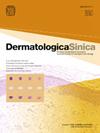原发性皮肤黏液癌中赖氨酸27处组蛋白H3三甲基化表达的降低
IF 2.2
4区 医学
Q2 DERMATOLOGY
引用次数: 1
摘要
原发性皮肤粘液癌(PCMC)是罕见的,其癌变机制尚不清楚。组蛋白H3在赖氨酸27位点的三甲基化(H3K27me3)是染色质重塑控制转录的关键调控因子。针对H3K27me3在PCMC中的表达机制,采用免疫组化方法研究H3K27me3在PCMC中的表达。本研究以台湾某三级医院PCMC病患为研究对象,评估其临床病理特征、治疗结果及蛋白表达。对所有PCMCs以及结肠黏液腺癌和单纯乳腺黏液癌的对照组进行H3K27me3免疫组化。计算并分析h3k27me3阴性肿瘤细胞的百分比。我们招募了3例PCMC患者。所有pcmc均为单生且生长缓慢,起源于头颈部区域。所有pcmc均切除肿瘤,无局部复发或转移。H3K27me3在PCMCs中的表达缺失(平均±标准差[SD]: 21.0%±6.6%)明显高于其他黏液癌(平均±SD: 3.8%±1.7%)(P = 0.019)。总之,我们报告了H3K27me3在PCMC中的表达降低。相比之下,H3K27me3的表达在其他黏液癌中保留或轻度降低。这是第一个表明表观遗传事件在PCMC病理生物学中的可能作用的研究。本文章由计算机程序翻译,如有差异,请以英文原文为准。
The reduced expression of trimethylation of histone H3 at lysine 27 in primary cutaneous mucinous carcinoma
Primary cutaneous mucinous carcinoma (PCMC) is rare, and its carcinogenesis is unclear. Trimethylation of histone H3 at lysine 27 (H3K27me3) is a key regulator in chromatin remodeling-controlled transcription. Focusing on the epigenetic mechanism, we aimed to investigate the expression of H3K27me3 in PCMC by immunohistochemistry. A retrospective cohort of PCMC patients from a tertiary hospital in Taiwan was enrolled to evaluate the clinicopathologic features, treatment outcome, and protein expression. Immunohistochemistry for H3K27me3 was performed on all PCMCs and a comparison group of colonic mucinous adenocarcinoma and pure mucinous carcinoma of the breast. The percentage of H3K27me3-negative tumor cells was calculated and analyzed. Three patients with PCMC were recruited. All PCMCs were solitary and slow growing, arising from the head-and-neck region. All PCMCs had tumor excision without local recurrence or metastasis. The loss of H3K27me3 expression was significant in PCMCs (mean ± standard deviation [SD]: 21.0% ± 6.6%) compared to other mucinous carcinomas (mean ± SD: 3.8% ± 1.7%) (P = 0.019). In conclusion, we report a reduction in H3K27me3 expression in PCMC. In contrast, H3K27me3 expression is retained or mildly reduced in other mucinous carcinomas. This is the first study to indicate a possible role of epigenetic events in the pathobiology of PCMC.
求助全文
通过发布文献求助,成功后即可免费获取论文全文。
去求助
来源期刊

Dermatologica Sinica
DERMATOLOGY-
CiteScore
2.80
自引率
20.00%
发文量
28
审稿时长
>12 weeks
期刊介绍:
Dermatologica Sinica aims to publish high quality scientific research in the field of dermatology, with the goal of promoting and disseminating dermatological-related medical science knowledge to improve global health. Articles on clinical, laboratory, educational, and social research in dermatology and other related fields that are of interest to the medical profession are eligible for consideration. Review articles, original articles, brief reports, case reports and correspondence are accepted.
 求助内容:
求助内容: 应助结果提醒方式:
应助结果提醒方式:


